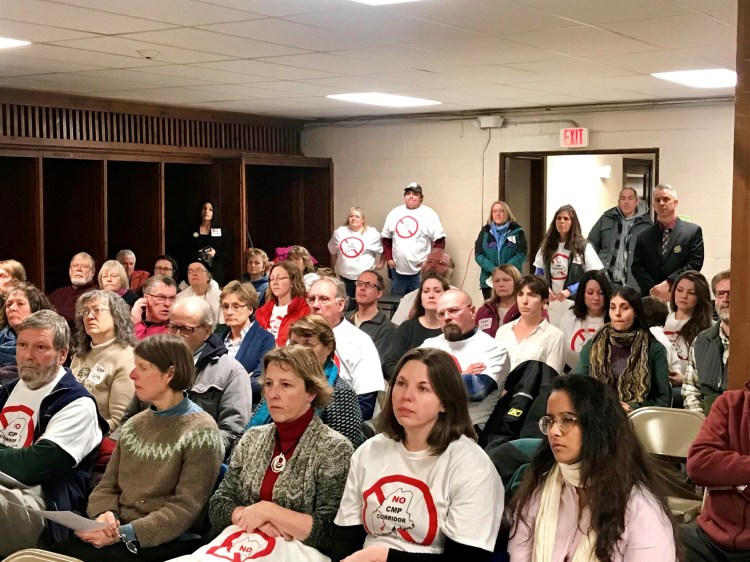FARMINGTON — A spokesman for Central Maine Power spoke to an at times hostile audience Tuesday night on what the company sees as the benefits of a proposed 145-mile transmission line through western Maine, after which many of his arguments were rebutted by a representative of the Natural Resources Council of Maine.

John Carroll, communications director for Central Maine Power, addresses the public and the Farmington Board of Selectmen, pictured in the background, during a board meeting Tuesday, Feb. 26, 2019 at the Farmington Community Center. Rachel Ohm
Both groups were invited to the Farmington Community Center Tuesday to address the Board of Selectmen. The meeting drew a crowd of about 100 people, many of whom wore T-shirts that said “NO CMP Corridor.”
“Claims that Maine doesn’t need this project are unfounded,” Carroll said. “Maine is as much a part of New England as any other state. We are suffering the consequences of high pricing, the environmental consequences of carbon emissions and we are equally vulnerable to fundamental unreliability of supply. That’s what this project is intended to address – our fundamental environmental and economic challenges.”
In a 30-minute presentation that was sometimes interrupted by people voicing their opposition to the project, Carroll said New England as a region struggles with rising electricity prices, carbon emissions and problems with reliability.
The New England Clean Energy Connect project, which would bring hydropower from Quebec to Massachusetts through Maine, would reduce carbon emissions by an estimated 3.6 million metric tons per year, Carroll said.
The project will also lower the cost of energy in New England’s grid by about $40 million per year, according to Carroll, though he noted the Maine Public Utilities Commission has estimated the amount to be about half that.
Another representative of CMP, Gerry Mirabile, a permitting manager for the project, also spoke Tuesday on why CMP picked the route it did for the project, which would enter Maine at Beattie Township in Franklin County, travel through Somerset County back into Franklin County and down to Lewiston.
He said it was designed to zigzag around environmental areas of concern and avoid sensitive areas.
The company will also be paying close to $6 million to compensate for environmental impacts, he said.
Carroll also talked about a $258 million settlement agreement CMP has proposed that would include $140 million to help Maine ratepayers reduce their bills and an additional $50 million in rate relief for low-income customers over the next 40 years.
In Franklin County, the company has pledged $5 million to support economic development; $4 million for vocational programs and education in Franklin and Somerset County school districts; and $1 million for internships and scholarships at the University of Maine at Farmington.
Sue Ely, a staff attorney at the Natural Resources Council of Maine, also spoke Tuesday night, saying despite the recent settlement proposal from CMP, the group is still opposed to the project.
“We believe this is still a bad deal for the state of Maine,” Ely said. “It won’t reduce green house gas benefits globally. It is still cutting 53 miles of new corridor from Beattie Township to Caratunk and it will still have impacts on deer wintering areas, wildlife, tourism and vernal pools.”
Ely said the group also believes the project will jeopardize Maine’s in-state clean energy projects and jobs and the proposed settlement is not enough when taken into consideration the money is spread over 40 years.
The project is planned for an area of the state largely made up of working forest, which is different than the picture some have painted of an untouched wilderness, but still worth preserving from the project, Ely said, because a working forest allows for re-growth and don’t leave the visual and environmental impacts a permanent transmission line will.
Finally, Ely said it is misleading to bill the project as if it were designed to address climate change.
“That’s not what this project is,” she said. “It’s CMP’s response to a bid request in Massachusetts. It’s not a solution by anybody looking to address the best solution to the problems in New England.”
Tuesday’s meeting came as the NECEC project remains under consideration. A decision from the Maine PUC is expected by the end of March or early April. Approvals are also needed from the Maine Department of Environmental Protection, Maine Land Use Planning Commission, U.S. Army Corps of Engineers and U.S. Department of Energy.
Residents in Farmington will have the opportunity to vote March 25 in a symbolic vote on whether they support the project.
One Farmington resident, Ken Decker, asked Tuesday whether the project will still move ahead if a significant number of residents in Farmington and elsewhere around the state say they don’t support it.
“Is the bureaucracy just going to do what they want to do?” Decker asked. “If 90 percent of us say we don’t want this are you going to let it go or will it happen anyway?”
“Our hope is this is not decided on a political basis,” Carroll said. “Our hope is this is decided on careful evaluation by people who are qualified and based on Maine’s laws and Maine’s regulations. That’s the purpose of this 18 month process: to make an informed, fact-based decision.”
“We’re just Farmington, but Farmington isn’t the only one opposed to this,” Decker said. “Right from the start, right down the line there’s opposition to this.”
Rachel Ohm — 612-2368
Twitter: @rachel_ohm
Send questions/comments to the editors.




Comments are no longer available on this story